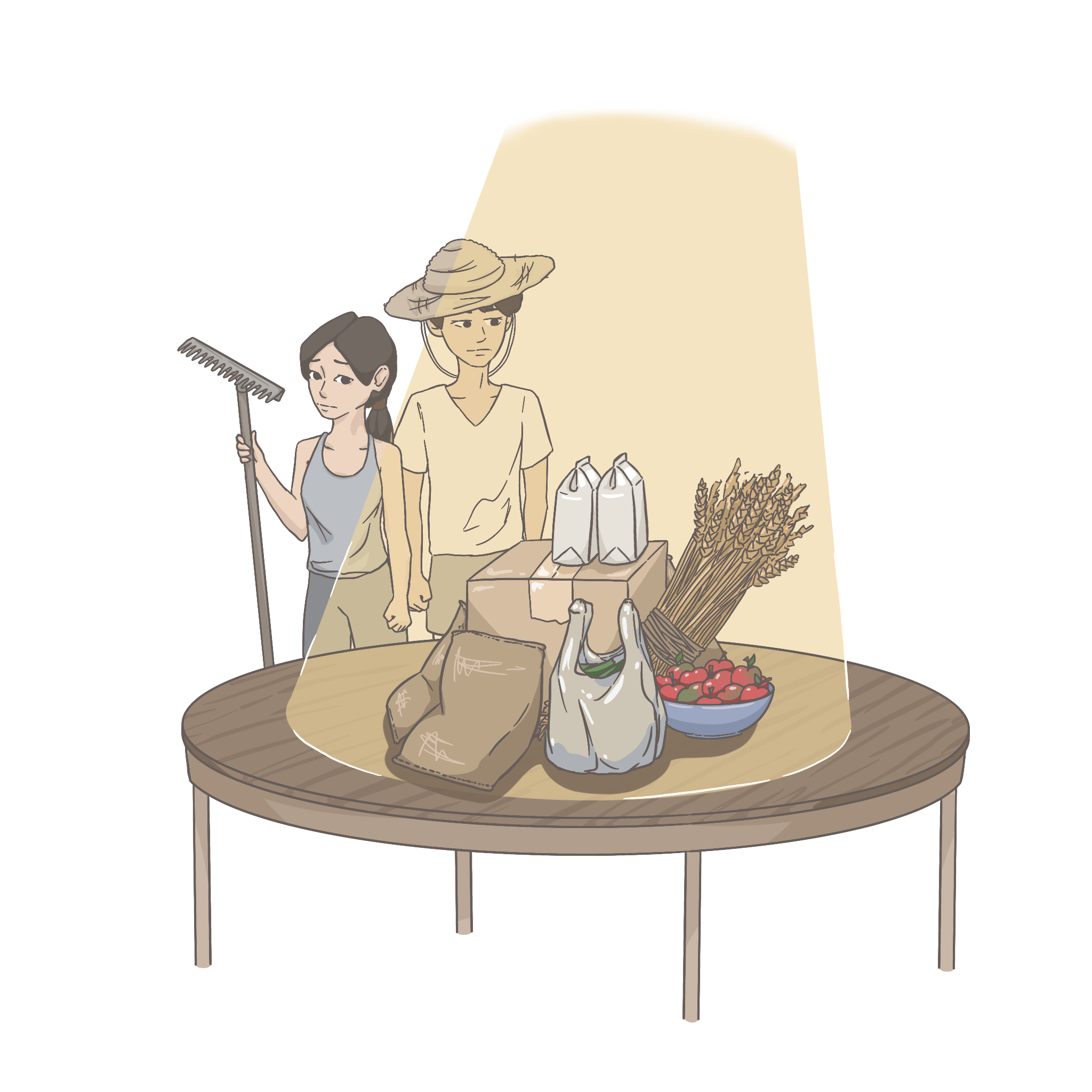The Ongoing Legacy of Colonization: A Look into Food Injustice in Puerto Rico
The Food and Agriculture Organization (FAO) of the United Nations (UN) states that food insecurity occurs when an individual does not have “regular access to enough safe and nutritious food for normal growth and development for an active and healthy life” [1]. Food insecurity ranges from mild to severe, with severe meaning that an individual goes without eating for more than a day [1]. A lack of a proper nutritional diet can lead to poor health outcomes such as obesity, low birth weight, stunted childhood growth, anemia, and adverse mental health effects such as a higher risk of developing anxiety or depression [2,3]. As of 2022, the FAO reports that severe insecurity continues to rise primarily due to existing inequities that have only been worsened by the COVID-19 Pandemic. In regions like Latin America, the Caribbean, Africa, and Asia, or otherwise known as the Global South, the FAO mentions that there has been an increase in hunger [3]. This leads us to a few questions: why has food insecurity continued to rise? Although, perhaps the better question to ask is what are the inequities influencing food insecurity in the Global South?
Original Illustration by Raven Lee
Undoubtedly, our world has been impacted by European colonization, which has defined borders, created racial hierarchies, and set the tone for much of our present-day politics. European colonization has also heavily impacted food systems globally, which some may describe as food regimes, meaning the production and consumption of food on a global scale [4]. The first food regime at this level was a result of European colonization, where colonies in the tropic would export crops like sugar and cocoa to settler colonies and colonial empire seats – and rely heavily on the imports from these colonies and empire seats – thus creating this reliance on imports [4,5]. This system was especially present in the Caribbean which created the plantation system that would exploit labour and land for profiting off foreign markets and foreign interests. This colonial food regime was not focused on creating sustainable food systems in this region [6]. The Caribbean food regime would proliferate during the Cold War as nations like the United States (US) would subsidize imports in order to create a reliance, and an alliance with the Global North for food [4,5]. However this would also have the effect of creating an unsustainable food system [4,5].
The most recent iteration of the food regime is due to neoliberalism and globalization, which has increased over-reliance on imports and exports in food supply chains that does not allow the creation of a sustainable food system. Essentially, if one part of this chain does not function properly, this can trigger issues like food insecurity and hunger [4,5]. This brings us to the question: how do food regimes function in practice? To illustrate how food regimes create unsustainable food systems, this article will use the island of Puerto Rico as an example.
“…if one part of this chain does not function properly, this can trigger issues like food insecurity and hunger".”
Puerto Rico, which the Taíno people first inhabited, was formerly colonized by the Spanish in 1493, who created the first of the aforementioned food regime on the island [4,7]. After losing the Spanish-American war in 1898, the island became a territory of the US, and an American territory [7]. In 1917, the US Congress passed the Jones Merchant Marine Act, also known as the Cabotage Laws, which essentially only allows US ships to dock in Puerto Rico [8]. Under the Jones Merchant Marine Act, any foreign ships going to Puerto Rico must dock in the mainland US first, before heading to Puerto Rico [8]. Furthermore, when ships now arrive in Puerto Rico, Puerto Ricans must pay 11.5% tax on imported food items on an island where 85% of food items are imported [8]. Due to its status as a territory, Puerto Rico does not have the ability to control its economy, or political processes, and by extension is reliant on the will of a Congress, where they have a nonvoting resident commissioner [8] . Essentially, they do not have representation in Congress [8].
In the 1950s, around the time of the aforementioned second food regime, the island’s food system and reliance on imports worsened as a result of industrialization initiatives, a higher demand for imported food items, limited agriculture for cash crop initiatives, and the lack of a sustainable food system on the island [7]. The globalization and neoliberalization of markets of the 1980s, around the time of the beginning of the current food regime, further eroded the ability of the island to create a sustainable food system as it furthered Puerto Rico’s agricultural scene only to produce cash crops [4,9]. The ongoing colonial legacy embedded into the agricultural system of Puerto Rico and its inability to produce crops for itself has profound impacts on the food security and health of the island.
The ongoing colonial legacy affects the island’s food security and Puerto Ricans’ health. The most immediate impacts of food insecurity in Puerto Rico can be found in diseases like obesity and hunger, especially amongst farmers [8,10]. In Puerto Rico, there has been an increase in obesity, which particularly worsened during the aftermath of Hurricane Maria due to the lack of available nutritious food [8]. The globalization of markets, and various US laws, have restricted agriculture to mostly cash crops rather than food staples, which has created the unsustainable food system seen in Puerto Rico [11]. This unsustainable food system has particularly hit small farmers, who report rather severe cases of food insecurity, such as going without meals for one day, or more [1,3,10]. In addition to the unsustainable agriculture system, the island’s heavy reliance on imports to provide non-cash crop food items – making the price of food items costly – also contributes to food insecurity [7,8]. The price of food and the unsustainable food system in Puerto Rico, like many other islands and areas that have had their agriculture systems defined by food regimes, have partly led to migration flows out of the island to US mainland cities like Miami or New York, fueled by the need to increase income to secure food [12,13,14]. Yet, how can we begin to address creating sustainable food systems for regions like Puerto Rico?
“This unsustainable food system has particularly hit small farmers, who report rather severe cases of food insecurity, such as going without meals for one day, or more.”
In order to address food injustice in places heavily affected by colonial food regimes like Puerto Rico, there have been calls for food sovereignty [15]. Food sovereignty is best defined as “the right of people to define their agricultural and food policy,” and this concept comes out of the La Via Campesina, otherwise known as the International Peasants’ Movement [16,17]. In the context of food insecurity and health, the idea of food sovereignty is intended to value food providers, localize food systems, and increase knowledge about food production and nutrition [15]. It is also seen as a way for people to obtain culturally appropriate foods, and an adequate amount of nutritious foods that could address food insecurity [18]. Food sovereignty also has the potential to allow for the decolonization of food regimes set in the Global South by putting the power of food production and food policies into the hands of the people and shifting the power balance back to the people [16,18]. This is to say that in order to address the global increase in food insecurity, associated with adverse health outcomes like obesity, it is perhaps best to consider how colonization has shaped our food systems and who it has affected the most. Moreover, we must understand how we can localize our food systems to decrease food insecurity, and perhaps we ought to look towards food sovereignty as part of the solution.
Eileen Murray (she/her) is a fourth-year undergraduate student at the University of Toronto studying Health Studies with a double minor in Urban Studies and Indigenous Studies. She has an interest in how larger systems impact health outcomes.
References
[1] FAO. (n.d.). Hunger and food insecurity. Food and Agriculture Organization of the United Nations. https://www.fao.org/hunger/en/
[2] Fang, D., Thomsen, M.R. & Nayga, R.M. The association between food insecurity and mental health during the COVID-19 pandemic. BMC Public Health 21, 607 (2021). https://doi.org/10.1186/s12889-021-10631-0
[3] FAO, IFAD, UNICEF, WFP and WHO. 2022. The State of Food Security and Nutrition in the World 2022. Repurposing food and agricultural policies to make healthy diets more affordable. Rome, FAO. https://doi.org/10.4060/cc0639en
[4] McMichael, P. (2009). A food regime genealogy. The Journal of Peasant Studies, 36(1), 139–169. https://doi.org/10.1080/03066150902820354
[5] Mann, A. (2019). Education for food sovereignty as transformative ethical practice. Policy Futures in Education, 17(7), 862–877. https://doi.org/10.1177/1478210318816251
[6] Saint Ville, A. S., Hickey, G. M., & Phillip, L. E. (2015). Addressing food and nutrition insecurity in the Caribbean through domestic smallholder farming system innovation. Regional Environmental Change, 15(7), 1325–1339. https://doi.org/10.1007/s10113-015-0770-9
[7] Díaz, G.V. (2021). The Right to Food in Puerto Rico: Where Colonialism and Disaster Meet. University of Miami Inter-American Law Review, 52(2), 105-139. https://repository.law.miami.edu/cgi/viewcontent.cgi?article=2607&context=umialr
[8] Ginzburg, S. L. (2022). Colonial comida: the colonization of food insecurity in Puerto Rico. Food, Culture, & Society, 25(1), 18–31. https://doi.org/10.1080/15528014.2021.1884440
[9] Bonilla, Y. (2020). The coloniality of disaster: Race, empire, and the temporal logics of emergency in Puerto Rico, USA. Political Geography, 78, 102181–. https://doi.org/10.1016/j.polgeo.2020.102181
[10] Rodríguez-Cruz, L. A., Álvarez-Berríos, N., & Niles, M. T. (2022). Social-ecological interactions in a disaster context: Puerto Rican farmer households’ food security after Hurricane Maria. Environmental Research Letters, 17(4), 44057–. https://doi.org/10.1088/1748-9326/ac6004
[11] Lakhani, N. (2021, December 23). ‘An act of rebellion’: the young farmers revolutionizing Puerto Rico’s agriculture. The Guardian. https://www.theguardian.com/environment/2021/dec/23/puerto-rico-agroecology-farmers
[12] Laborde, D., Bizikova, L., Lallemant, T., & Smaller, C. What is the Link Between Hunger and Migration? International Institute for Sustainable Development. https://www.iisd.org/system/files/publications/link-between-hunger-migration.pdf
[13] Ayala, C. (1996). The Decline of the Plantation Economy and the Puerto Rican Migration of the 1950s. Latino Studies Journal 7(1), 61-90, https://lcw.lehman.edu/lehman/depts/latinampuertorican/latinoweb/PuertoRico/ayalamigration.pdf
[14] Cheatham, A. & Roy, D. (2022, September 29). Puerto Rico: A U.S. Territory in Crisis. Council on Foreign Relations. https://www.cfr.org/backgrounder/puerto-rico-us-territory-crisis
[15] Thompson, M. S. (2019). Still searching for (food) sovereignty: Why are radical discourses only partially mobilised in the independent Anglo-Caribbean? Geoforum, 101, 90–99. https://doi.org/10.1016/j.geoforum.2019.02.028
[16] La Via Campesina. (2003, January 15). Food sovereignty. La Via Campesina. https://viacampesina.org/en/food-sovereignty/
[17] Weiler, A. M., Hergesheimer, C., Brisbois, B., Wittman, H., Yassi, A., & Spiegel, J. M. (2015). Food sovereignty, food security and health equity: a meta-narrative mapping exercise. Health Policy and Planning, 30(8), 1078–1092. https://doi.org/10.1093/heapol/czu109
[18] Leventon, J., & Laudan, J. (2017). Local food sovereignty for global food security? Highlighting interplay challenges. Geoforum, 85, 23–26. https://doi.org/10.1016/j.geoforum.2017.07.002


